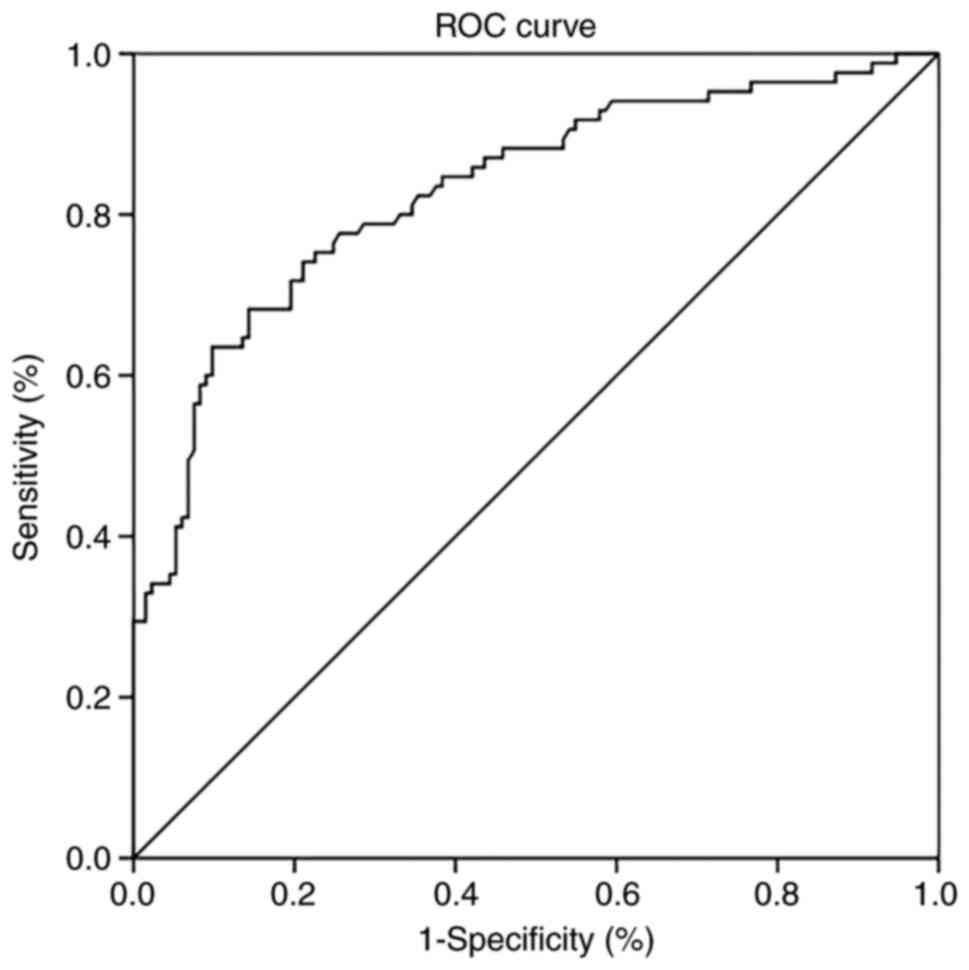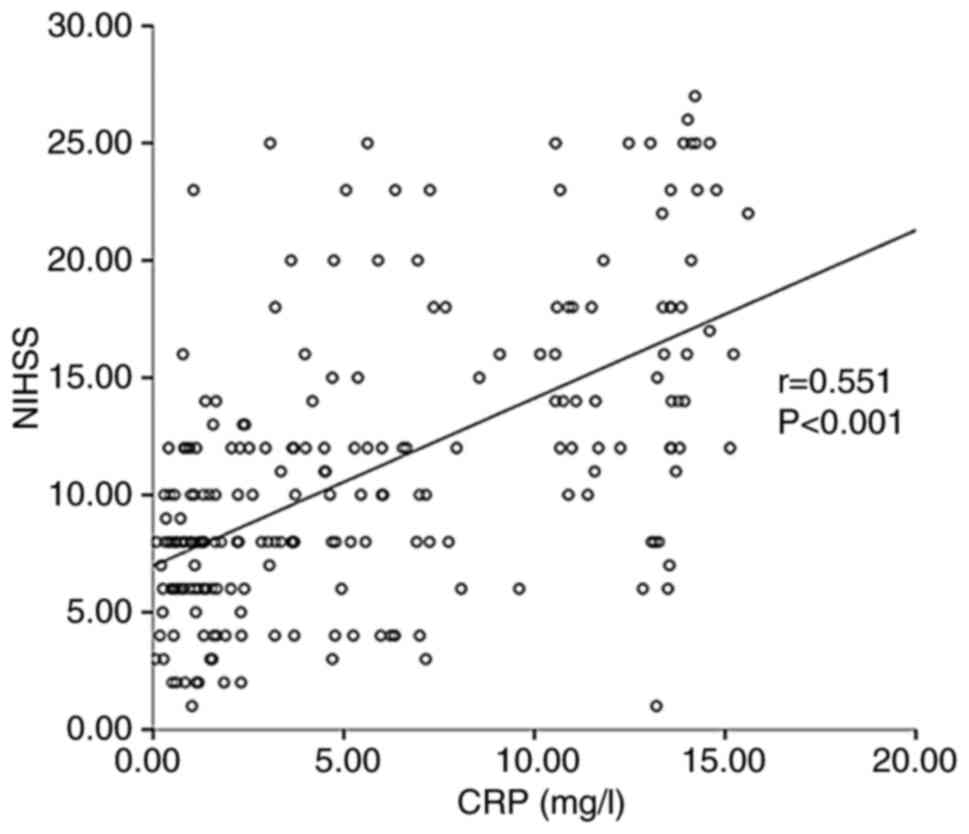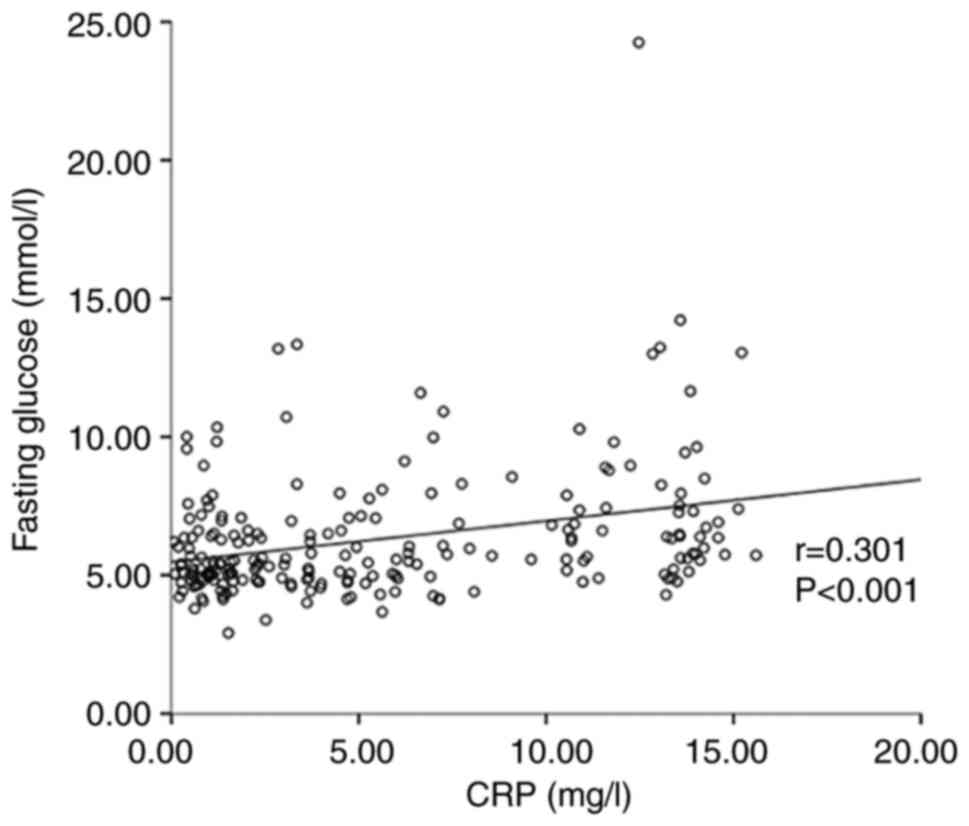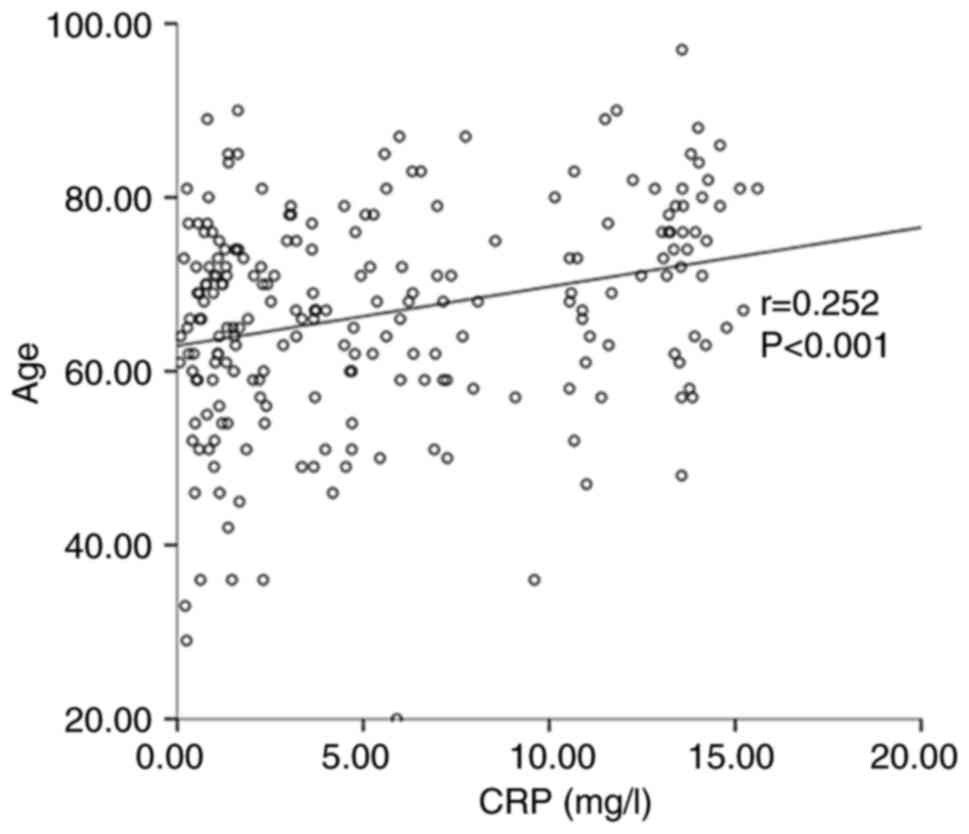|
1
|
GBD 2019 Diseases and Injuries
Collaborators. Global burden of 369 diseases and injuries in 204
countries and territories, 1990-2019: A systematic analysis for the
Global Burden of Disease Study 2019. Lancet. 396:1204–1222.
2020.PubMed/NCBI View Article : Google Scholar
|
|
2
|
Ojaghihaghighi S, Vahdati SS, Mikaeilpour
A and Ramouz A: Comparison of neurological clinical manifestation
in patients with hemorrhagic and ischemic stroke. World J Emerg
Med. 8:34–38. 2017.PubMed/NCBI View Article : Google Scholar
|
|
3
|
Benjamin EJ, Virani SS, Callaway CW,
Chamberlain AM, Chang AR, Cheng S, Chiuve SE, Cushman M, Delling
FN, Deo R, et al: Heart disease and stroke statistics-2018 update:
A report from the American heart association. Circulation.
137:e67–e492. 2018.PubMed/NCBI View Article : Google Scholar
|
|
4
|
Mu SW, Dang Y, Wang SS and Gu JJ: The role
of high mobility group box 1 protein in acute cerebrovascular
diseases. Biomed Rep. 9:191–197. 2018.PubMed/NCBI View Article : Google Scholar
|
|
5
|
Godinho J, de Oliveira RMW, de
Sa-Nakanishi AB, Bacarin CC, Huzita CH, Longhini R, Mello JCP,
Nakamura CV, Previdelli IS, Dal Molin Ribeiro MH and Milani H:
Ethyl-acetate fraction of Trichilia catigua restores long-term
retrograde memory and reduces oxidative stress and inflammation
after global cerebral ischemia in rats. Behav Brain Res.
337:173–182. 2018.PubMed/NCBI View Article : Google Scholar
|
|
6
|
Xu X, Yuan L, Wang W, Xu J, Yang Q, Zhu Y,
Xu Y, Yang K, Ge L, Huang X and Zhou Z: Systemic inflammatory
response syndrome and outcomes in ischemic patients treated with
endovascular treatment. Clin Interv Aging. 15:2331–2340.
2020.PubMed/NCBI View Article : Google Scholar
|
|
7
|
Shi K, Tian DC, Li ZG, Ducruet AF, Lawton
MT and Shi FD: Global brain inflammation in stroke. Lancet Neurol.
18:1058–1066. 2019.PubMed/NCBI View Article : Google Scholar
|
|
8
|
Wang L, Li Y, Wang C, Guo W and Liu M:
C-reactive protein, infection, and outcome after acute ischemic
stroke: A registry and systematic review. Curr Neurovasc Res.
16:405–415. 2019.PubMed/NCBI View Article : Google Scholar
|
|
9
|
Bilgin S, Kurtkulagi O, Atak BM, Duman TT,
Kahveci G, Khalid A and Aktas G: Does C-reactive protein to serum
Albumin Ratio correlate with diabEtic nephropathy in patients with
Type 2 dIabetes MEllitus? The CARE TIME study. Prim Care Diabetes.
15:1071–1074. 2021.PubMed/NCBI View Article : Google Scholar
|
|
10
|
Baruah MP, Bhattacharya B and Baruah UM:
C-Reactive protein level can be a better indicator than erythrocyte
sedimentation rate in assessing the severity of inflammation and
guiding glucocorticoid therapy in subacute thyroiditis. Indian J
Endocrinol Metab. 26:328–333. 2022.PubMed/NCBI View Article : Google Scholar
|
|
11
|
Demirkol ME, Aktas G, Bilgin S, Kahveci G,
Kurtkulagi O, Atak BM and Duman TT: C-reactive protein to
lymphocyte count ratio is a promising novel marker in hepatitis C
infection: The clear hep-c study. Rev Assoc Med Bras (1992).
68:838–841. 2022.PubMed/NCBI View Article : Google Scholar
|
|
12
|
VanGilder RL, Davidov DM, Stinehart KR,
Huber JD, Turner RC, Wilson KS, Haney E, Davis SM, Chantler PD,
Theeke L, et al: C-reactive protein and long-term ischemic stroke
prognosis. J Clin Neurosci. 21:547–553. 2014.PubMed/NCBI View Article : Google Scholar
|
|
13
|
Rocco A, Ringleb PA, Grittner U, Nolte CH,
Schneider A and Nagel S: Follow-up C-reactive protein level is more
strongly associated with outcome in stroke patients than admission
levels. Neurol Sci. 36:2235–2241. 2015.PubMed/NCBI View Article : Google Scholar
|
|
14
|
Geng HH, Wang XW, Fu RL, Jing MJ, Huang
LL, Zhang Q, Wang XX and Wang PX: The Relationship between
C-Reactive Protein level and discharge outcome in patients with
acute ischemic stroke. Int J Environ Res Public Health.
13(636)2016.PubMed/NCBI View Article : Google Scholar
|
|
15
|
Li J, Zhao X, Meng X, Lin J, Liu L, Wang
C, Wang A and Wang Y and Wang Y: CHANCE Investigators.
High-Sensitive C-Reactive protein predicts recurrent stroke and
poor functional outcome: Subanalysis of the clopidogrel in
high-risk patients with acute nondisabling cerebrovascular events
trial. Stroke. 47:2025–2030. 2016.PubMed/NCBI View Article : Google Scholar
|
|
16
|
Topakian R, Strasak AM, Nussbaumer K,
Haring HP and Aichner FT: Prognostic value of admission C-reactive
protein in stroke patients undergoing iv thrombolysis. J Neurol.
255:1190–1196. 2008.PubMed/NCBI View Article : Google Scholar
|
|
17
|
Karlinski M, Bembenek J, Grabska K,
Kobayashi A, Baranowska A, Litwin T and Czlonkowska A: Routine
serum C-reactive protein and stroke outcome after intravenous
thrombolysis. Acta Neurol Scand. 130:305–311. 2014.PubMed/NCBI View Article : Google Scholar
|
|
18
|
Lee S, Song IU, Na SH, Jeong DS and Chung
SW: Association between long-term functional outcome and change in
hs-CRP level in patients with acute ischemic stroke. Neurologist.
25:122–125. 2020.PubMed/NCBI View Article : Google Scholar
|
|
19
|
Liu L, Chen W, Zhou H, Duan W, Li S, Huo
X, Xu W, Huang L, Zheng H, Liu J, et al: Chinese Stroke Association
guidelines for clinical management of cerebrovascular disorders:
Executive summary and 2019 update of clinical management of
ischaemic cerebrovascular diseases. Stroke Vasc Neurol. 5:159–176.
2020.PubMed/NCBI View Article : Google Scholar
|
|
20
|
Zhang XG, Xue J, Yang WH, Xu XS, Sun HX,
Hu L, Liu LY and Yue YH: Inflammatory markers as independent
predictors for stroke outcomes. Brain Behav.
11(e01922)2021.PubMed/NCBI View Article : Google Scholar
|
|
21
|
Ye Z, Zhang H, Sun L, Cai H, Hao Y, Xu Z,
Zhang Z and Liu X: GWAS-Supported CRP gene polymorphisms and
functional outcome of large artery atherosclerotic stroke in han
Chinese. Neuromolecular Med. 20:225–232. 2018.PubMed/NCBI View Article : Google Scholar
|
|
22
|
Abubakar SA, Okubadejo NU, Ojo OO, Oladipo
O, Ojini FI and Danesi MA: Relationship between admission serum
C-reactive protein and short term outcome following acute ischaemic
stroke at a tertiary health institution in Nigeria. Niger J Clin
Pract. 16:320–324. 2013.PubMed/NCBI View Article : Google Scholar
|
|
23
|
Ye L, Cai R, Yang M, Qian J and Hong Z:
Reduction of the systemic inflammatory induced by acute cerebral
infarction through ultra-early thrombolytic therapy. Exp Ther Med.
10:1493–1498. 2015.PubMed/NCBI View Article : Google Scholar
|
|
24
|
Suda S, Aoki J, Shimoyama T, Suzuki K,
Sakamoto Y, Katano T, Okubo S, Nito C, Nishiyama Y, Mishina M and
Kimura K: Stroke-associated infection independently predicts
3-month poor functional outcome and mortality. J Neurol.
265:370–375. 2018.PubMed/NCBI View Article : Google Scholar
|
|
25
|
Ye Z, Zhang Z, Zhang H, Hao Y, Zhang J,
Liu W, Xu G and Liu X: Prognostic Value of C-Reactive protein and
homocysteine in large-artery atherosclerotic stroke: A prospective
observational study. J Stroke Cerebrovasc Dis. 26:618–626.
2017.PubMed/NCBI View Article : Google Scholar
|
|
26
|
Irimie CA, Varciu M, Irimie M, Ifteni PI
and Minea DI: C-Reactive Protein and T3: New prognostic factors in
acute ischemic stroke. J Stroke Cerebrovasc Dis. 27:2731–2737.
2018.PubMed/NCBI View Article : Google Scholar
|
|
27
|
Arenillas JF, Alvarez-Sabin J, Molina CA,
Chacon P, Montaner J, Rovira A, Ibarra B and Quintana M: C-reactive
protein predicts further ischemic events in first-ever transient
ischemic attack or stroke patients with intracranial large-artery
occlusive disease. Stroke. 34:2463–2468. 2003.PubMed/NCBI View Article : Google Scholar
|
|
28
|
Audebert HJ, Rott MM, Eck T and Haberl RL:
Systemic inflammatory response depends on initial stroke severity
but is attenuated by successful thrombolysis. Stroke. 35:2128–2133.
2004.PubMed/NCBI View Article : Google Scholar
|
|
29
|
Chinsky K: The evolving paradigm of
hyperglycemia and critical illness. Chest. 126:674–676.
2004.PubMed/NCBI View Article : Google Scholar
|
|
30
|
Robinson LE and van Soeren MH: Insulin
resistance and hyperglycemia in critical illness: Role of insulin
in glycemic control. AACN Clin Issues. 15:45–62. 2004.PubMed/NCBI View Article : Google Scholar
|
|
31
|
Stephan Y, Sutin AR and Terracciano A:
Younger subjective age is associated with lower C-reactive protein
among older adults. Brain Behav Immun. 43:33–36. 2015.PubMed/NCBI View Article : Google Scholar
|
|
32
|
Woloshin S and Schwartz LM: Distribution
of C-reactive protein values in the United States. N Engl J Med.
352:1611–1613. 2005.PubMed/NCBI View Article : Google Scholar
|
|
33
|
Caudroit J, Stephan Y, Chalabaev A and Le
Scanff C: Subjective age and social-cognitive determinants of
physical activity in active older adults. J Aging Phys Act.
20:484–496. 2012.PubMed/NCBI View Article : Google Scholar
|


















